Risk Factors for Dementia in Elderly Patients in the UK
VerifiedAdded on 2023/06/08
|13
|3819
|498
AI Summary
This literature review focuses on the risk factors that contribute to dementia in elderly patients in the UK. The study aims to provide insight into the alarming statistics and figures of rising cases of dementia in the UK. The research was conducted using various resources such as PubMed, Science Direct, and Cochrane Library. The stakeholders of this research were the patients, public, and policy makers. The research highlights the importance of good health in an individual's life and how it can prevent the onset of dementia.
Contribute Materials
Your contribution can guide someone’s learning journey. Share your
documents today.
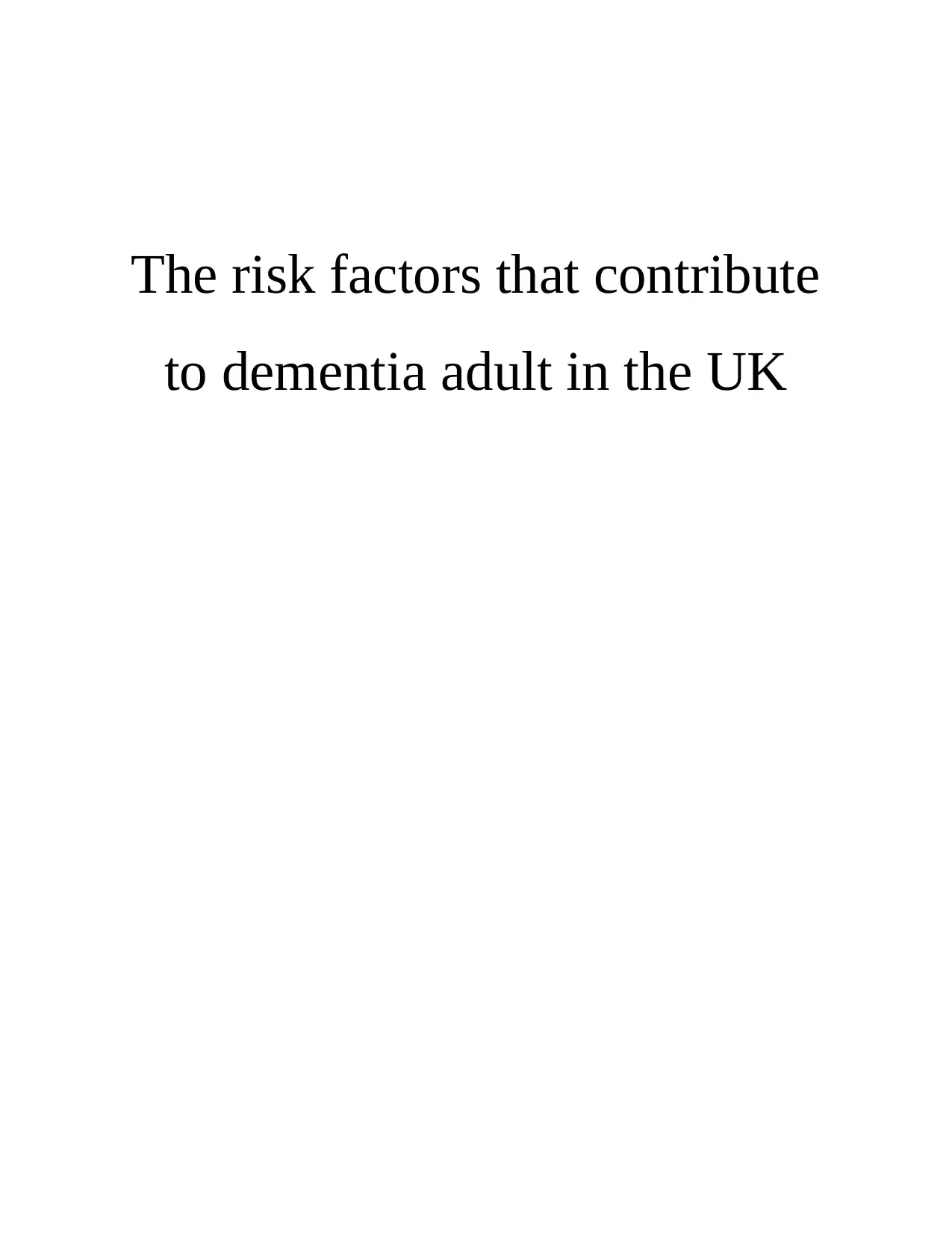
The risk factors that contribute
to dementia adult in the UK
to dementia adult in the UK
Secure Best Marks with AI Grader
Need help grading? Try our AI Grader for instant feedback on your assignments.
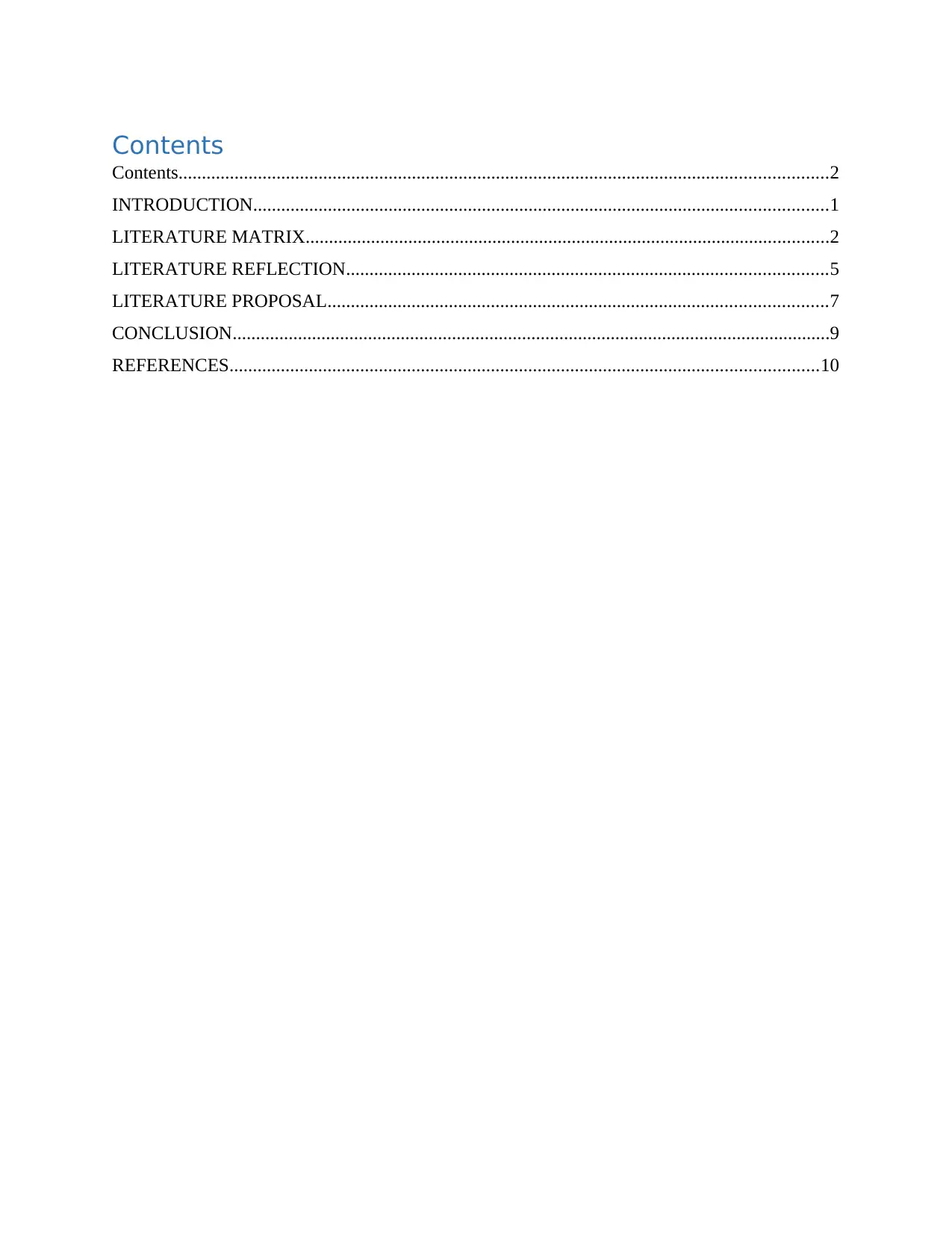
Contents
Contents...........................................................................................................................................2
INTRODUCTION...........................................................................................................................1
LITERATURE MATRIX................................................................................................................2
LITERATURE REFLECTION.......................................................................................................5
LITERATURE PROPOSAL...........................................................................................................7
CONCLUSION................................................................................................................................9
REFERENCES..............................................................................................................................10
Contents...........................................................................................................................................2
INTRODUCTION...........................................................................................................................1
LITERATURE MATRIX................................................................................................................2
LITERATURE REFLECTION.......................................................................................................5
LITERATURE PROPOSAL...........................................................................................................7
CONCLUSION................................................................................................................................9
REFERENCES..............................................................................................................................10
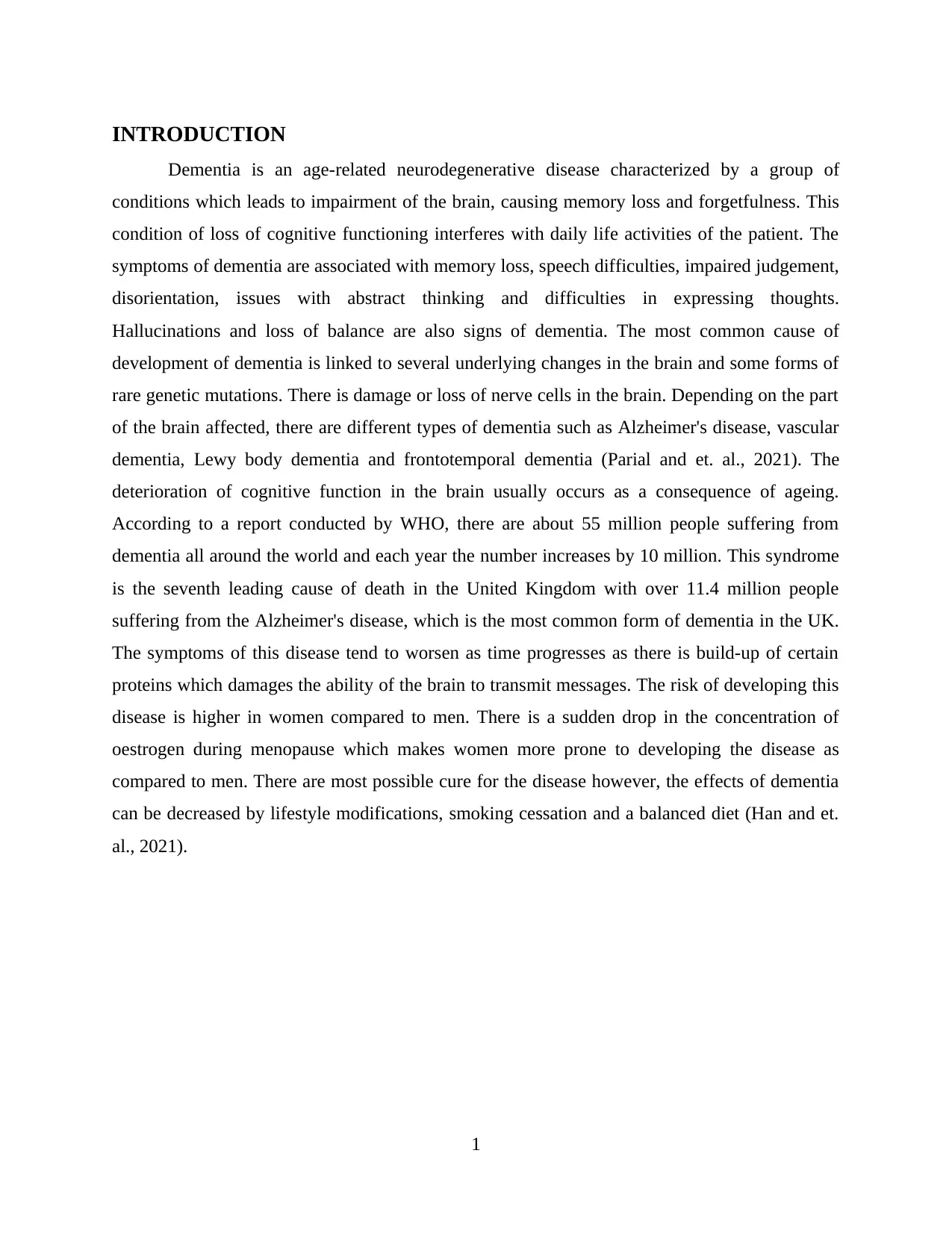
INTRODUCTION
Dementia is an age-related neurodegenerative disease characterized by a group of
conditions which leads to impairment of the brain, causing memory loss and forgetfulness. This
condition of loss of cognitive functioning interferes with daily life activities of the patient. The
symptoms of dementia are associated with memory loss, speech difficulties, impaired judgement,
disorientation, issues with abstract thinking and difficulties in expressing thoughts.
Hallucinations and loss of balance are also signs of dementia. The most common cause of
development of dementia is linked to several underlying changes in the brain and some forms of
rare genetic mutations. There is damage or loss of nerve cells in the brain. Depending on the part
of the brain affected, there are different types of dementia such as Alzheimer's disease, vascular
dementia, Lewy body dementia and frontotemporal dementia (Parial and et. al., 2021). The
deterioration of cognitive function in the brain usually occurs as a consequence of ageing.
According to a report conducted by WHO, there are about 55 million people suffering from
dementia all around the world and each year the number increases by 10 million. This syndrome
is the seventh leading cause of death in the United Kingdom with over 11.4 million people
suffering from the Alzheimer's disease, which is the most common form of dementia in the UK.
The symptoms of this disease tend to worsen as time progresses as there is build-up of certain
proteins which damages the ability of the brain to transmit messages. The risk of developing this
disease is higher in women compared to men. There is a sudden drop in the concentration of
oestrogen during menopause which makes women more prone to developing the disease as
compared to men. There are most possible cure for the disease however, the effects of dementia
can be decreased by lifestyle modifications, smoking cessation and a balanced diet (Han and et.
al., 2021).
1
Dementia is an age-related neurodegenerative disease characterized by a group of
conditions which leads to impairment of the brain, causing memory loss and forgetfulness. This
condition of loss of cognitive functioning interferes with daily life activities of the patient. The
symptoms of dementia are associated with memory loss, speech difficulties, impaired judgement,
disorientation, issues with abstract thinking and difficulties in expressing thoughts.
Hallucinations and loss of balance are also signs of dementia. The most common cause of
development of dementia is linked to several underlying changes in the brain and some forms of
rare genetic mutations. There is damage or loss of nerve cells in the brain. Depending on the part
of the brain affected, there are different types of dementia such as Alzheimer's disease, vascular
dementia, Lewy body dementia and frontotemporal dementia (Parial and et. al., 2021). The
deterioration of cognitive function in the brain usually occurs as a consequence of ageing.
According to a report conducted by WHO, there are about 55 million people suffering from
dementia all around the world and each year the number increases by 10 million. This syndrome
is the seventh leading cause of death in the United Kingdom with over 11.4 million people
suffering from the Alzheimer's disease, which is the most common form of dementia in the UK.
The symptoms of this disease tend to worsen as time progresses as there is build-up of certain
proteins which damages the ability of the brain to transmit messages. The risk of developing this
disease is higher in women compared to men. There is a sudden drop in the concentration of
oestrogen during menopause which makes women more prone to developing the disease as
compared to men. There are most possible cure for the disease however, the effects of dementia
can be decreased by lifestyle modifications, smoking cessation and a balanced diet (Han and et.
al., 2021).
1
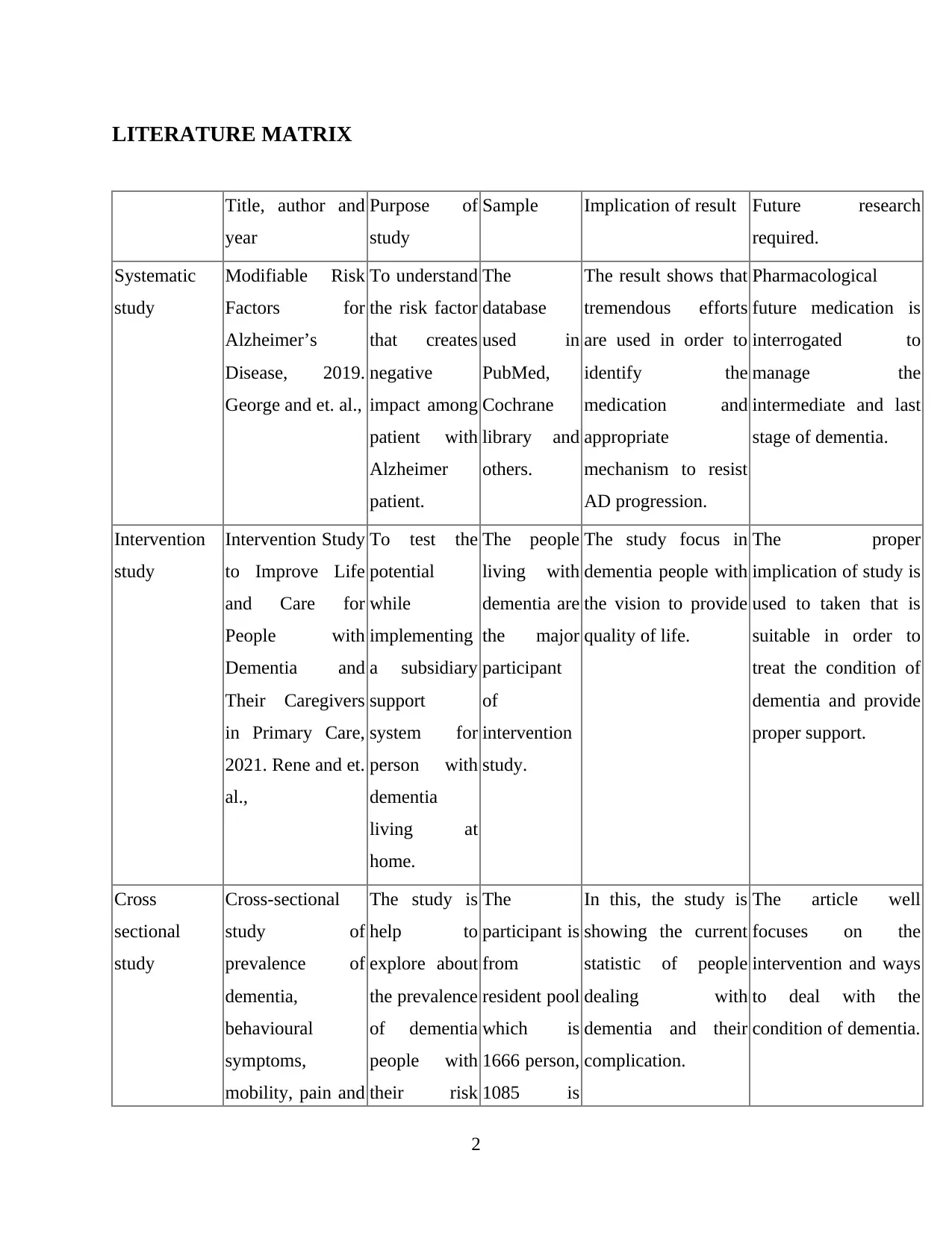
LITERATURE MATRIX
Title, author and
year
Purpose of
study
Sample Implication of result Future research
required.
Systematic
study
Modifiable Risk
Factors for
Alzheimer’s
Disease, 2019.
George and et. al.,
To understand
the risk factor
that creates
negative
impact among
patient with
Alzheimer
patient.
The
database
used in
PubMed,
Cochrane
library and
others.
The result shows that
tremendous efforts
are used in order to
identify the
medication and
appropriate
mechanism to resist
AD progression.
Pharmacological
future medication is
interrogated to
manage the
intermediate and last
stage of dementia.
Intervention
study
Intervention Study
to Improve Life
and Care for
People with
Dementia and
Their Caregivers
in Primary Care,
2021. Rene and et.
al.,
To test the
potential
while
implementing
a subsidiary
support
system for
person with
dementia
living at
home.
The people
living with
dementia are
the major
participant
of
intervention
study.
The study focus in
dementia people with
the vision to provide
quality of life.
The proper
implication of study is
used to taken that is
suitable in order to
treat the condition of
dementia and provide
proper support.
Cross
sectional
study
Cross-sectional
study of
prevalence of
dementia,
behavioural
symptoms,
mobility, pain and
The study is
help to
explore about
the prevalence
of dementia
people with
their risk
The
participant is
from
resident pool
which is
1666 person,
1085 is
In this, the study is
showing the current
statistic of people
dealing with
dementia and their
complication.
The article well
focuses on the
intervention and ways
to deal with the
condition of dementia.
2
Title, author and
year
Purpose of
study
Sample Implication of result Future research
required.
Systematic
study
Modifiable Risk
Factors for
Alzheimer’s
Disease, 2019.
George and et. al.,
To understand
the risk factor
that creates
negative
impact among
patient with
Alzheimer
patient.
The
database
used in
PubMed,
Cochrane
library and
others.
The result shows that
tremendous efforts
are used in order to
identify the
medication and
appropriate
mechanism to resist
AD progression.
Pharmacological
future medication is
interrogated to
manage the
intermediate and last
stage of dementia.
Intervention
study
Intervention Study
to Improve Life
and Care for
People with
Dementia and
Their Caregivers
in Primary Care,
2021. Rene and et.
al.,
To test the
potential
while
implementing
a subsidiary
support
system for
person with
dementia
living at
home.
The people
living with
dementia are
the major
participant
of
intervention
study.
The study focus in
dementia people with
the vision to provide
quality of life.
The proper
implication of study is
used to taken that is
suitable in order to
treat the condition of
dementia and provide
proper support.
Cross
sectional
study
Cross-sectional
study of
prevalence of
dementia,
behavioural
symptoms,
mobility, pain and
The study is
help to
explore about
the prevalence
of dementia
people with
their risk
The
participant is
from
resident pool
which is
1666 person,
1085 is
In this, the study is
showing the current
statistic of people
dealing with
dementia and their
complication.
The article well
focuses on the
intervention and ways
to deal with the
condition of dementia.
2
Secure Best Marks with AI Grader
Need help grading? Try our AI Grader for instant feedback on your assignments.
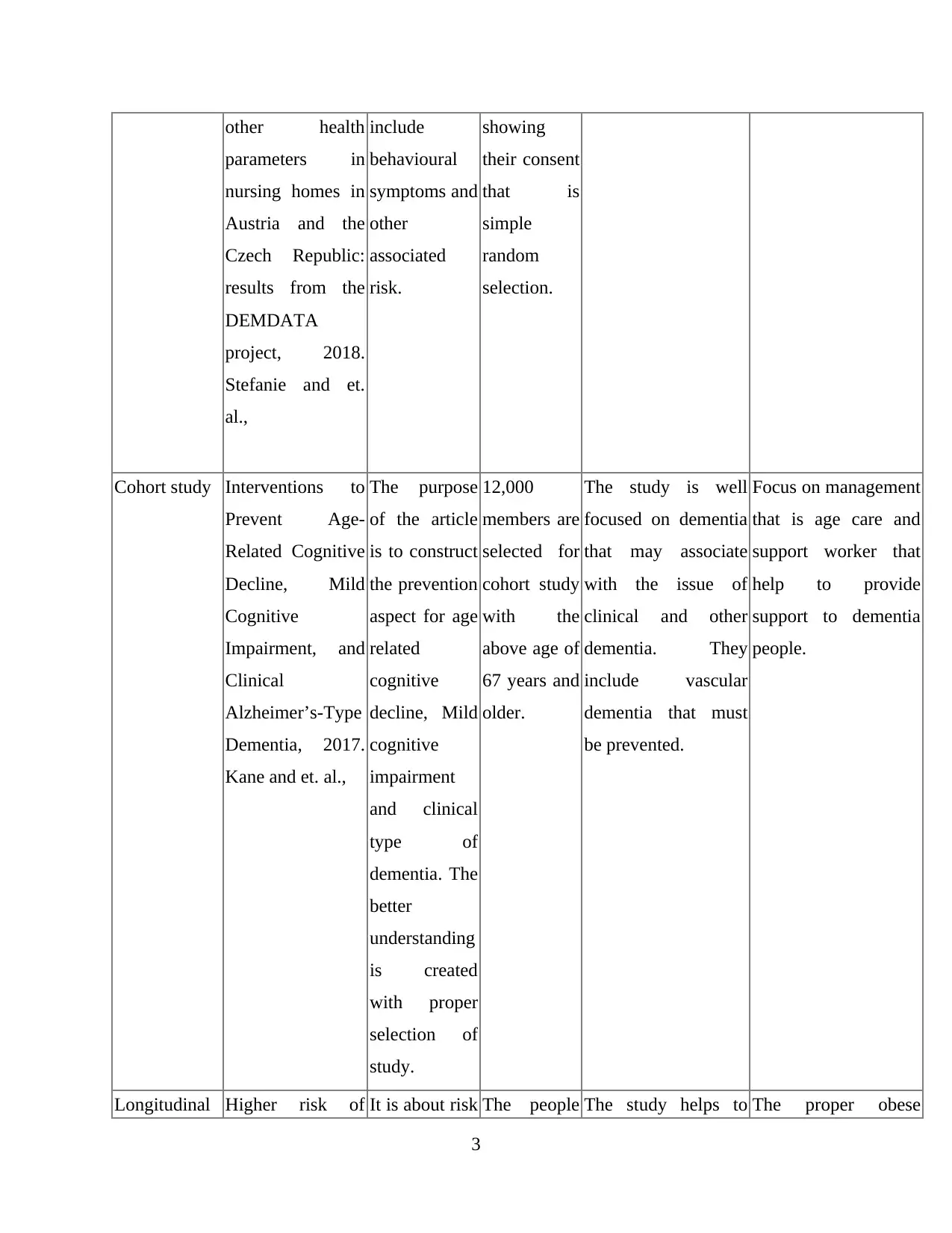
other health
parameters in
nursing homes in
Austria and the
Czech Republic:
results from the
DEMDATA
project, 2018.
Stefanie and et.
al.,
include
behavioural
symptoms and
other
associated
risk.
showing
their consent
that is
simple
random
selection.
Cohort study Interventions to
Prevent Age-
Related Cognitive
Decline, Mild
Cognitive
Impairment, and
Clinical
Alzheimer’s-Type
Dementia, 2017.
Kane and et. al.,
The purpose
of the article
is to construct
the prevention
aspect for age
related
cognitive
decline, Mild
cognitive
impairment
and clinical
type of
dementia. The
better
understanding
is created
with proper
selection of
study.
12,000
members are
selected for
cohort study
with the
above age of
67 years and
older.
The study is well
focused on dementia
that may associate
with the issue of
clinical and other
dementia. They
include vascular
dementia that must
be prevented.
Focus on management
that is age care and
support worker that
help to provide
support to dementia
people.
Longitudinal Higher risk of It is about risk The people The study helps to The proper obese
3
parameters in
nursing homes in
Austria and the
Czech Republic:
results from the
DEMDATA
project, 2018.
Stefanie and et.
al.,
include
behavioural
symptoms and
other
associated
risk.
showing
their consent
that is
simple
random
selection.
Cohort study Interventions to
Prevent Age-
Related Cognitive
Decline, Mild
Cognitive
Impairment, and
Clinical
Alzheimer’s-Type
Dementia, 2017.
Kane and et. al.,
The purpose
of the article
is to construct
the prevention
aspect for age
related
cognitive
decline, Mild
cognitive
impairment
and clinical
type of
dementia. The
better
understanding
is created
with proper
selection of
study.
12,000
members are
selected for
cohort study
with the
above age of
67 years and
older.
The study is well
focused on dementia
that may associate
with the issue of
clinical and other
dementia. They
include vascular
dementia that must
be prevented.
Focus on management
that is age care and
support worker that
help to provide
support to dementia
people.
Longitudinal Higher risk of It is about risk The people The study helps to The proper obese
3
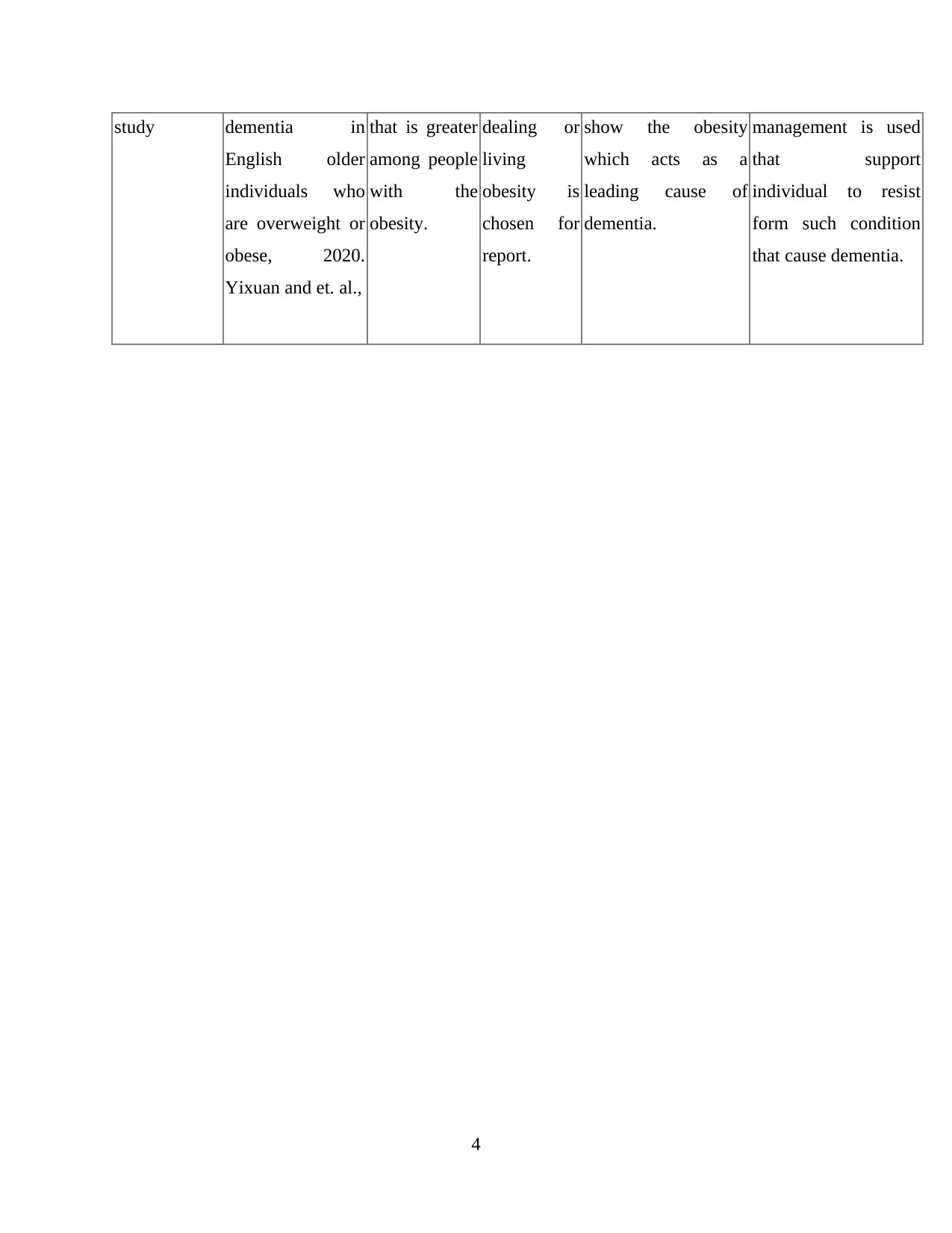
study dementia in
English older
individuals who
are overweight or
obese, 2020.
Yixuan and et. al.,
that is greater
among people
with the
obesity.
dealing or
living
obesity is
chosen for
report.
show the obesity
which acts as a
leading cause of
dementia.
management is used
that support
individual to resist
form such condition
that cause dementia.
4
English older
individuals who
are overweight or
obese, 2020.
Yixuan and et. al.,
that is greater
among people
with the
obesity.
dealing or
living
obesity is
chosen for
report.
show the obesity
which acts as a
leading cause of
dementia.
management is used
that support
individual to resist
form such condition
that cause dementia.
4
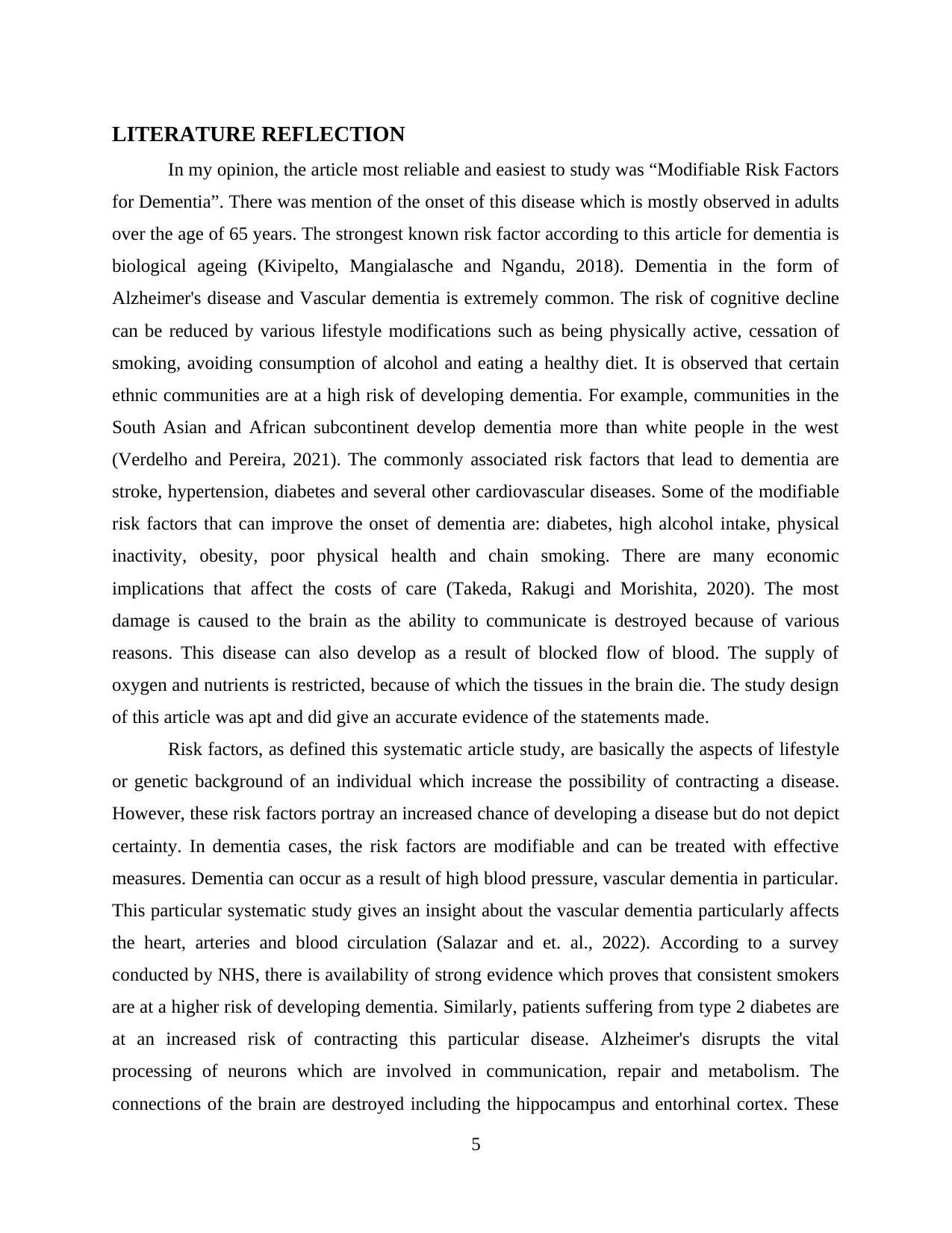
LITERATURE REFLECTION
In my opinion, the article most reliable and easiest to study was “Modifiable Risk Factors
for Dementia”. There was mention of the onset of this disease which is mostly observed in adults
over the age of 65 years. The strongest known risk factor according to this article for dementia is
biological ageing (Kivipelto, Mangialasche and Ngandu, 2018). Dementia in the form of
Alzheimer's disease and Vascular dementia is extremely common. The risk of cognitive decline
can be reduced by various lifestyle modifications such as being physically active, cessation of
smoking, avoiding consumption of alcohol and eating a healthy diet. It is observed that certain
ethnic communities are at a high risk of developing dementia. For example, communities in the
South Asian and African subcontinent develop dementia more than white people in the west
(Verdelho and Pereira, 2021). The commonly associated risk factors that lead to dementia are
stroke, hypertension, diabetes and several other cardiovascular diseases. Some of the modifiable
risk factors that can improve the onset of dementia are: diabetes, high alcohol intake, physical
inactivity, obesity, poor physical health and chain smoking. There are many economic
implications that affect the costs of care (Takeda, Rakugi and Morishita, 2020). The most
damage is caused to the brain as the ability to communicate is destroyed because of various
reasons. This disease can also develop as a result of blocked flow of blood. The supply of
oxygen and nutrients is restricted, because of which the tissues in the brain die. The study design
of this article was apt and did give an accurate evidence of the statements made.
Risk factors, as defined this systematic article study, are basically the aspects of lifestyle
or genetic background of an individual which increase the possibility of contracting a disease.
However, these risk factors portray an increased chance of developing a disease but do not depict
certainty. In dementia cases, the risk factors are modifiable and can be treated with effective
measures. Dementia can occur as a result of high blood pressure, vascular dementia in particular.
This particular systematic study gives an insight about the vascular dementia particularly affects
the heart, arteries and blood circulation (Salazar and et. al., 2022). According to a survey
conducted by NHS, there is availability of strong evidence which proves that consistent smokers
are at a higher risk of developing dementia. Similarly, patients suffering from type 2 diabetes are
at an increased risk of contracting this particular disease. Alzheimer's disrupts the vital
processing of neurons which are involved in communication, repair and metabolism. The
connections of the brain are destroyed including the hippocampus and entorhinal cortex. These
5
In my opinion, the article most reliable and easiest to study was “Modifiable Risk Factors
for Dementia”. There was mention of the onset of this disease which is mostly observed in adults
over the age of 65 years. The strongest known risk factor according to this article for dementia is
biological ageing (Kivipelto, Mangialasche and Ngandu, 2018). Dementia in the form of
Alzheimer's disease and Vascular dementia is extremely common. The risk of cognitive decline
can be reduced by various lifestyle modifications such as being physically active, cessation of
smoking, avoiding consumption of alcohol and eating a healthy diet. It is observed that certain
ethnic communities are at a high risk of developing dementia. For example, communities in the
South Asian and African subcontinent develop dementia more than white people in the west
(Verdelho and Pereira, 2021). The commonly associated risk factors that lead to dementia are
stroke, hypertension, diabetes and several other cardiovascular diseases. Some of the modifiable
risk factors that can improve the onset of dementia are: diabetes, high alcohol intake, physical
inactivity, obesity, poor physical health and chain smoking. There are many economic
implications that affect the costs of care (Takeda, Rakugi and Morishita, 2020). The most
damage is caused to the brain as the ability to communicate is destroyed because of various
reasons. This disease can also develop as a result of blocked flow of blood. The supply of
oxygen and nutrients is restricted, because of which the tissues in the brain die. The study design
of this article was apt and did give an accurate evidence of the statements made.
Risk factors, as defined this systematic article study, are basically the aspects of lifestyle
or genetic background of an individual which increase the possibility of contracting a disease.
However, these risk factors portray an increased chance of developing a disease but do not depict
certainty. In dementia cases, the risk factors are modifiable and can be treated with effective
measures. Dementia can occur as a result of high blood pressure, vascular dementia in particular.
This particular systematic study gives an insight about the vascular dementia particularly affects
the heart, arteries and blood circulation (Salazar and et. al., 2022). According to a survey
conducted by NHS, there is availability of strong evidence which proves that consistent smokers
are at a higher risk of developing dementia. Similarly, patients suffering from type 2 diabetes are
at an increased risk of contracting this particular disease. Alzheimer's disrupts the vital
processing of neurons which are involved in communication, repair and metabolism. The
connections of the brain are destroyed including the hippocampus and entorhinal cortex. These
5
Paraphrase This Document
Need a fresh take? Get an instant paraphrase of this document with our AI Paraphraser
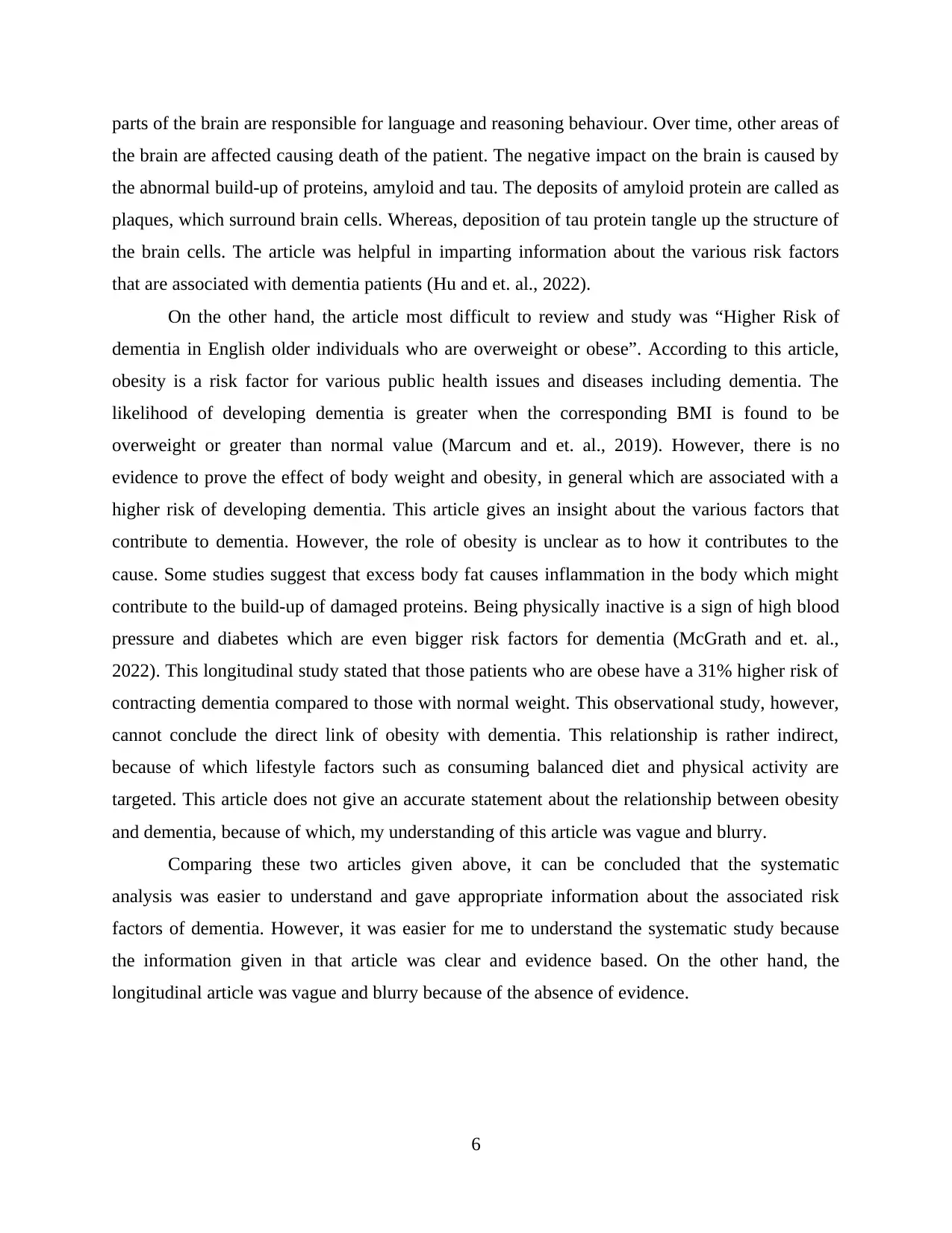
parts of the brain are responsible for language and reasoning behaviour. Over time, other areas of
the brain are affected causing death of the patient. The negative impact on the brain is caused by
the abnormal build-up of proteins, amyloid and tau. The deposits of amyloid protein are called as
plaques, which surround brain cells. Whereas, deposition of tau protein tangle up the structure of
the brain cells. The article was helpful in imparting information about the various risk factors
that are associated with dementia patients (Hu and et. al., 2022).
On the other hand, the article most difficult to review and study was “Higher Risk of
dementia in English older individuals who are overweight or obese”. According to this article,
obesity is a risk factor for various public health issues and diseases including dementia. The
likelihood of developing dementia is greater when the corresponding BMI is found to be
overweight or greater than normal value (Marcum and et. al., 2019). However, there is no
evidence to prove the effect of body weight and obesity, in general which are associated with a
higher risk of developing dementia. This article gives an insight about the various factors that
contribute to dementia. However, the role of obesity is unclear as to how it contributes to the
cause. Some studies suggest that excess body fat causes inflammation in the body which might
contribute to the build-up of damaged proteins. Being physically inactive is a sign of high blood
pressure and diabetes which are even bigger risk factors for dementia (McGrath and et. al.,
2022). This longitudinal study stated that those patients who are obese have a 31% higher risk of
contracting dementia compared to those with normal weight. This observational study, however,
cannot conclude the direct link of obesity with dementia. This relationship is rather indirect,
because of which lifestyle factors such as consuming balanced diet and physical activity are
targeted. This article does not give an accurate statement about the relationship between obesity
and dementia, because of which, my understanding of this article was vague and blurry.
Comparing these two articles given above, it can be concluded that the systematic
analysis was easier to understand and gave appropriate information about the associated risk
factors of dementia. However, it was easier for me to understand the systematic study because
the information given in that article was clear and evidence based. On the other hand, the
longitudinal article was vague and blurry because of the absence of evidence.
6
the brain are affected causing death of the patient. The negative impact on the brain is caused by
the abnormal build-up of proteins, amyloid and tau. The deposits of amyloid protein are called as
plaques, which surround brain cells. Whereas, deposition of tau protein tangle up the structure of
the brain cells. The article was helpful in imparting information about the various risk factors
that are associated with dementia patients (Hu and et. al., 2022).
On the other hand, the article most difficult to review and study was “Higher Risk of
dementia in English older individuals who are overweight or obese”. According to this article,
obesity is a risk factor for various public health issues and diseases including dementia. The
likelihood of developing dementia is greater when the corresponding BMI is found to be
overweight or greater than normal value (Marcum and et. al., 2019). However, there is no
evidence to prove the effect of body weight and obesity, in general which are associated with a
higher risk of developing dementia. This article gives an insight about the various factors that
contribute to dementia. However, the role of obesity is unclear as to how it contributes to the
cause. Some studies suggest that excess body fat causes inflammation in the body which might
contribute to the build-up of damaged proteins. Being physically inactive is a sign of high blood
pressure and diabetes which are even bigger risk factors for dementia (McGrath and et. al.,
2022). This longitudinal study stated that those patients who are obese have a 31% higher risk of
contracting dementia compared to those with normal weight. This observational study, however,
cannot conclude the direct link of obesity with dementia. This relationship is rather indirect,
because of which lifestyle factors such as consuming balanced diet and physical activity are
targeted. This article does not give an accurate statement about the relationship between obesity
and dementia, because of which, my understanding of this article was vague and blurry.
Comparing these two articles given above, it can be concluded that the systematic
analysis was easier to understand and gave appropriate information about the associated risk
factors of dementia. However, it was easier for me to understand the systematic study because
the information given in that article was clear and evidence based. On the other hand, the
longitudinal article was vague and blurry because of the absence of evidence.
6
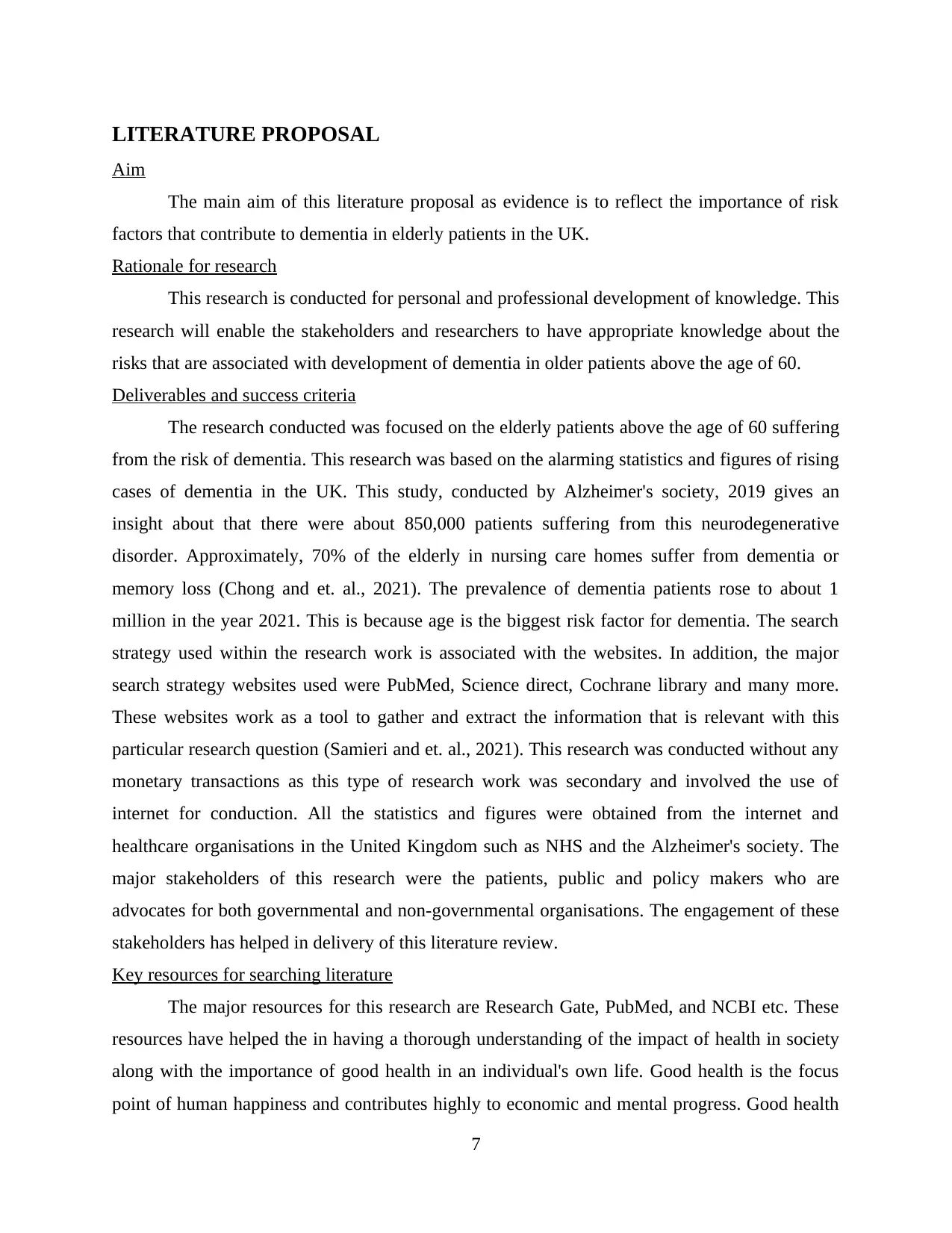
LITERATURE PROPOSAL
Aim
The main aim of this literature proposal as evidence is to reflect the importance of risk
factors that contribute to dementia in elderly patients in the UK.
Rationale for research
This research is conducted for personal and professional development of knowledge. This
research will enable the stakeholders and researchers to have appropriate knowledge about the
risks that are associated with development of dementia in older patients above the age of 60.
Deliverables and success criteria
The research conducted was focused on the elderly patients above the age of 60 suffering
from the risk of dementia. This research was based on the alarming statistics and figures of rising
cases of dementia in the UK. This study, conducted by Alzheimer's society, 2019 gives an
insight about that there were about 850,000 patients suffering from this neurodegenerative
disorder. Approximately, 70% of the elderly in nursing care homes suffer from dementia or
memory loss (Chong and et. al., 2021). The prevalence of dementia patients rose to about 1
million in the year 2021. This is because age is the biggest risk factor for dementia. The search
strategy used within the research work is associated with the websites. In addition, the major
search strategy websites used were PubMed, Science direct, Cochrane library and many more.
These websites work as a tool to gather and extract the information that is relevant with this
particular research question (Samieri and et. al., 2021). This research was conducted without any
monetary transactions as this type of research work was secondary and involved the use of
internet for conduction. All the statistics and figures were obtained from the internet and
healthcare organisations in the United Kingdom such as NHS and the Alzheimer's society. The
major stakeholders of this research were the patients, public and policy makers who are
advocates for both governmental and non-governmental organisations. The engagement of these
stakeholders has helped in delivery of this literature review.
Key resources for searching literature
The major resources for this research are Research Gate, PubMed, and NCBI etc. These
resources have helped the in having a thorough understanding of the impact of health in society
along with the importance of good health in an individual's own life. Good health is the focus
point of human happiness and contributes highly to economic and mental progress. Good health
7
Aim
The main aim of this literature proposal as evidence is to reflect the importance of risk
factors that contribute to dementia in elderly patients in the UK.
Rationale for research
This research is conducted for personal and professional development of knowledge. This
research will enable the stakeholders and researchers to have appropriate knowledge about the
risks that are associated with development of dementia in older patients above the age of 60.
Deliverables and success criteria
The research conducted was focused on the elderly patients above the age of 60 suffering
from the risk of dementia. This research was based on the alarming statistics and figures of rising
cases of dementia in the UK. This study, conducted by Alzheimer's society, 2019 gives an
insight about that there were about 850,000 patients suffering from this neurodegenerative
disorder. Approximately, 70% of the elderly in nursing care homes suffer from dementia or
memory loss (Chong and et. al., 2021). The prevalence of dementia patients rose to about 1
million in the year 2021. This is because age is the biggest risk factor for dementia. The search
strategy used within the research work is associated with the websites. In addition, the major
search strategy websites used were PubMed, Science direct, Cochrane library and many more.
These websites work as a tool to gather and extract the information that is relevant with this
particular research question (Samieri and et. al., 2021). This research was conducted without any
monetary transactions as this type of research work was secondary and involved the use of
internet for conduction. All the statistics and figures were obtained from the internet and
healthcare organisations in the United Kingdom such as NHS and the Alzheimer's society. The
major stakeholders of this research were the patients, public and policy makers who are
advocates for both governmental and non-governmental organisations. The engagement of these
stakeholders has helped in delivery of this literature review.
Key resources for searching literature
The major resources for this research are Research Gate, PubMed, and NCBI etc. These
resources have helped the in having a thorough understanding of the impact of health in society
along with the importance of good health in an individual's own life. Good health is the focus
point of human happiness and contributes highly to economic and mental progress. Good health
7
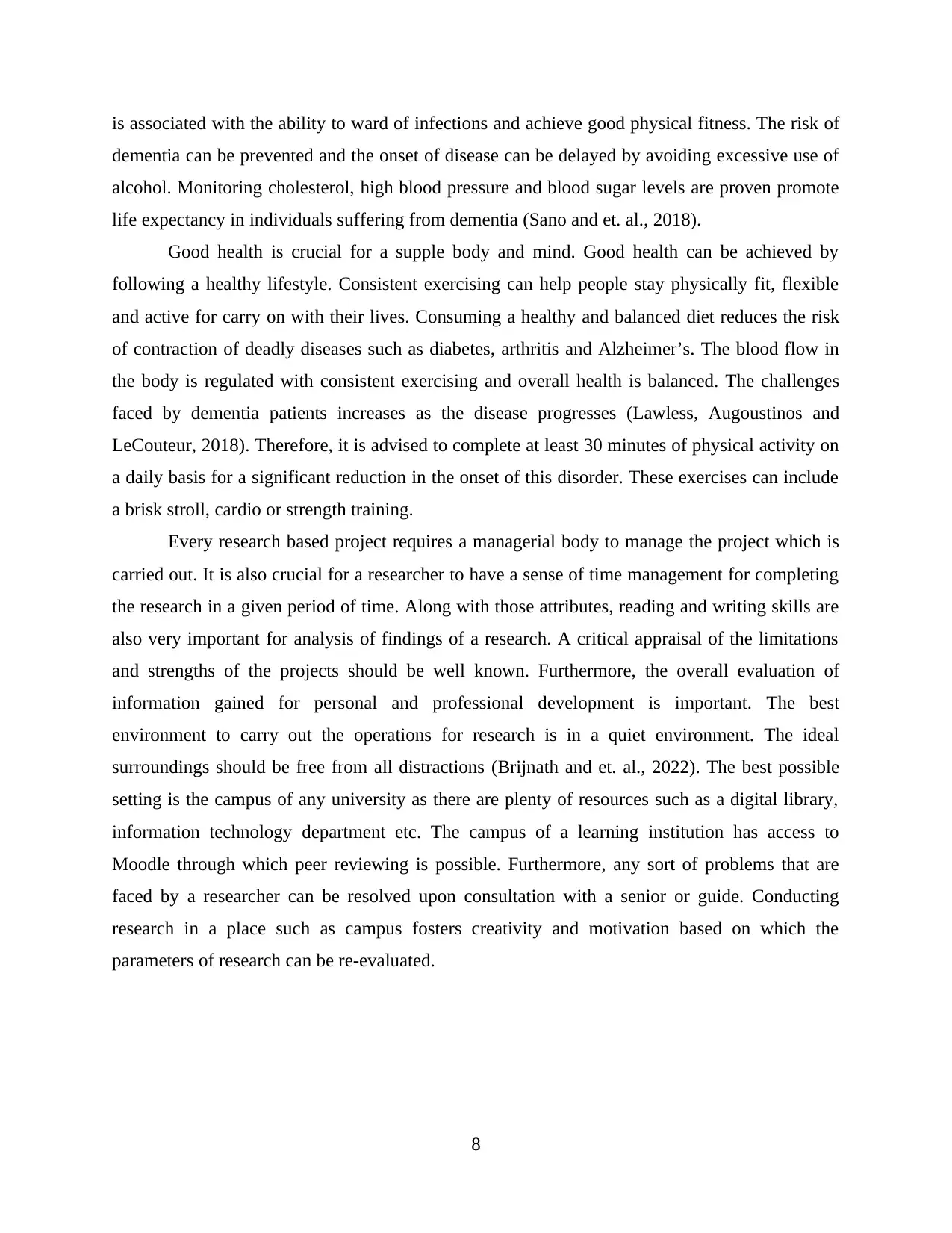
is associated with the ability to ward of infections and achieve good physical fitness. The risk of
dementia can be prevented and the onset of disease can be delayed by avoiding excessive use of
alcohol. Monitoring cholesterol, high blood pressure and blood sugar levels are proven promote
life expectancy in individuals suffering from dementia (Sano and et. al., 2018).
Good health is crucial for a supple body and mind. Good health can be achieved by
following a healthy lifestyle. Consistent exercising can help people stay physically fit, flexible
and active for carry on with their lives. Consuming a healthy and balanced diet reduces the risk
of contraction of deadly diseases such as diabetes, arthritis and Alzheimer’s. The blood flow in
the body is regulated with consistent exercising and overall health is balanced. The challenges
faced by dementia patients increases as the disease progresses (Lawless, Augoustinos and
LeCouteur, 2018). Therefore, it is advised to complete at least 30 minutes of physical activity on
a daily basis for a significant reduction in the onset of this disorder. These exercises can include
a brisk stroll, cardio or strength training.
Every research based project requires a managerial body to manage the project which is
carried out. It is also crucial for a researcher to have a sense of time management for completing
the research in a given period of time. Along with those attributes, reading and writing skills are
also very important for analysis of findings of a research. A critical appraisal of the limitations
and strengths of the projects should be well known. Furthermore, the overall evaluation of
information gained for personal and professional development is important. The best
environment to carry out the operations for research is in a quiet environment. The ideal
surroundings should be free from all distractions (Brijnath and et. al., 2022). The best possible
setting is the campus of any university as there are plenty of resources such as a digital library,
information technology department etc. The campus of a learning institution has access to
Moodle through which peer reviewing is possible. Furthermore, any sort of problems that are
faced by a researcher can be resolved upon consultation with a senior or guide. Conducting
research in a place such as campus fosters creativity and motivation based on which the
parameters of research can be re-evaluated.
8
dementia can be prevented and the onset of disease can be delayed by avoiding excessive use of
alcohol. Monitoring cholesterol, high blood pressure and blood sugar levels are proven promote
life expectancy in individuals suffering from dementia (Sano and et. al., 2018).
Good health is crucial for a supple body and mind. Good health can be achieved by
following a healthy lifestyle. Consistent exercising can help people stay physically fit, flexible
and active for carry on with their lives. Consuming a healthy and balanced diet reduces the risk
of contraction of deadly diseases such as diabetes, arthritis and Alzheimer’s. The blood flow in
the body is regulated with consistent exercising and overall health is balanced. The challenges
faced by dementia patients increases as the disease progresses (Lawless, Augoustinos and
LeCouteur, 2018). Therefore, it is advised to complete at least 30 minutes of physical activity on
a daily basis for a significant reduction in the onset of this disorder. These exercises can include
a brisk stroll, cardio or strength training.
Every research based project requires a managerial body to manage the project which is
carried out. It is also crucial for a researcher to have a sense of time management for completing
the research in a given period of time. Along with those attributes, reading and writing skills are
also very important for analysis of findings of a research. A critical appraisal of the limitations
and strengths of the projects should be well known. Furthermore, the overall evaluation of
information gained for personal and professional development is important. The best
environment to carry out the operations for research is in a quiet environment. The ideal
surroundings should be free from all distractions (Brijnath and et. al., 2022). The best possible
setting is the campus of any university as there are plenty of resources such as a digital library,
information technology department etc. The campus of a learning institution has access to
Moodle through which peer reviewing is possible. Furthermore, any sort of problems that are
faced by a researcher can be resolved upon consultation with a senior or guide. Conducting
research in a place such as campus fosters creativity and motivation based on which the
parameters of research can be re-evaluated.
8
Secure Best Marks with AI Grader
Need help grading? Try our AI Grader for instant feedback on your assignments.
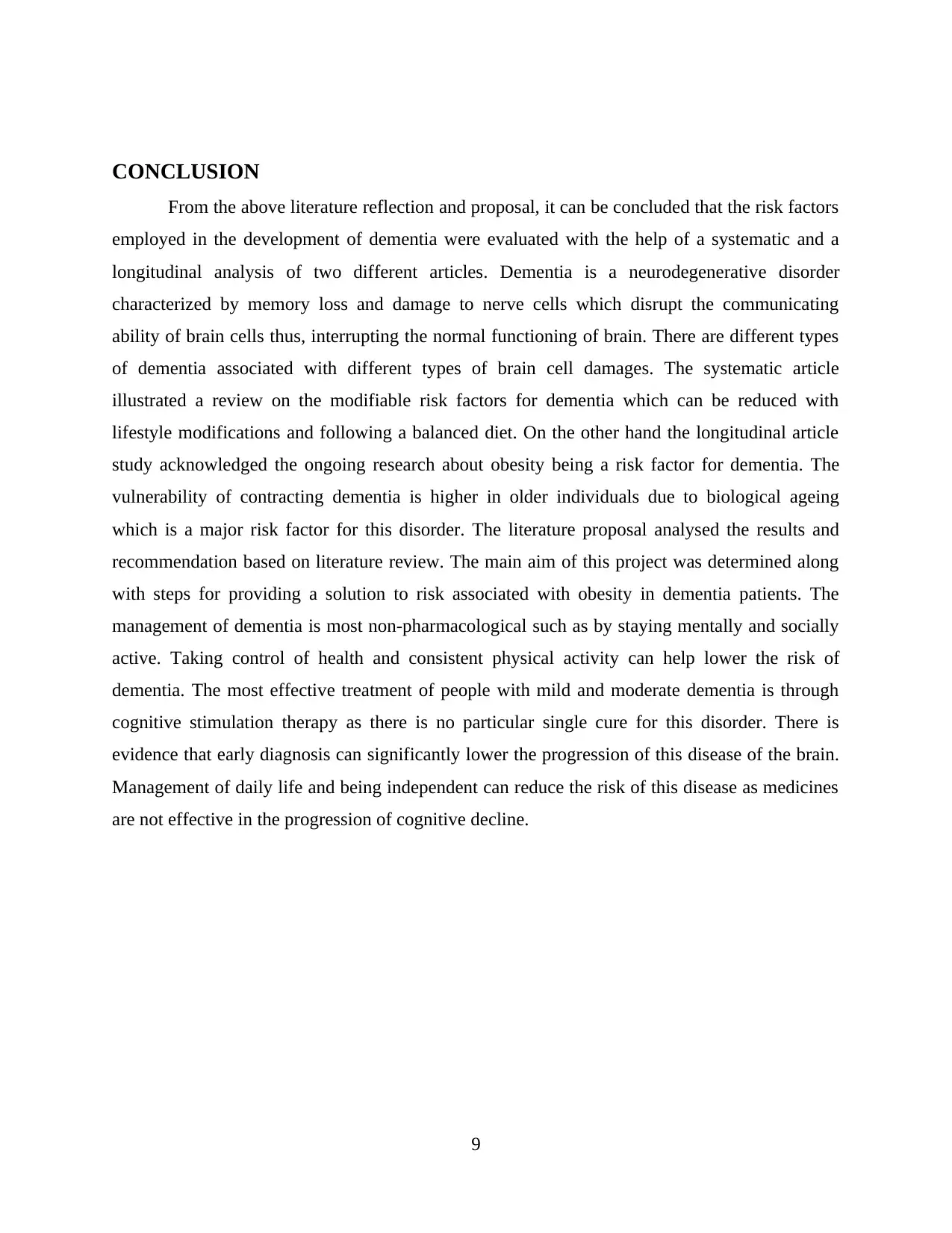
CONCLUSION
From the above literature reflection and proposal, it can be concluded that the risk factors
employed in the development of dementia were evaluated with the help of a systematic and a
longitudinal analysis of two different articles. Dementia is a neurodegenerative disorder
characterized by memory loss and damage to nerve cells which disrupt the communicating
ability of brain cells thus, interrupting the normal functioning of brain. There are different types
of dementia associated with different types of brain cell damages. The systematic article
illustrated a review on the modifiable risk factors for dementia which can be reduced with
lifestyle modifications and following a balanced diet. On the other hand the longitudinal article
study acknowledged the ongoing research about obesity being a risk factor for dementia. The
vulnerability of contracting dementia is higher in older individuals due to biological ageing
which is a major risk factor for this disorder. The literature proposal analysed the results and
recommendation based on literature review. The main aim of this project was determined along
with steps for providing a solution to risk associated with obesity in dementia patients. The
management of dementia is most non-pharmacological such as by staying mentally and socially
active. Taking control of health and consistent physical activity can help lower the risk of
dementia. The most effective treatment of people with mild and moderate dementia is through
cognitive stimulation therapy as there is no particular single cure for this disorder. There is
evidence that early diagnosis can significantly lower the progression of this disease of the brain.
Management of daily life and being independent can reduce the risk of this disease as medicines
are not effective in the progression of cognitive decline.
9
From the above literature reflection and proposal, it can be concluded that the risk factors
employed in the development of dementia were evaluated with the help of a systematic and a
longitudinal analysis of two different articles. Dementia is a neurodegenerative disorder
characterized by memory loss and damage to nerve cells which disrupt the communicating
ability of brain cells thus, interrupting the normal functioning of brain. There are different types
of dementia associated with different types of brain cell damages. The systematic article
illustrated a review on the modifiable risk factors for dementia which can be reduced with
lifestyle modifications and following a balanced diet. On the other hand the longitudinal article
study acknowledged the ongoing research about obesity being a risk factor for dementia. The
vulnerability of contracting dementia is higher in older individuals due to biological ageing
which is a major risk factor for this disorder. The literature proposal analysed the results and
recommendation based on literature review. The main aim of this project was determined along
with steps for providing a solution to risk associated with obesity in dementia patients. The
management of dementia is most non-pharmacological such as by staying mentally and socially
active. Taking control of health and consistent physical activity can help lower the risk of
dementia. The most effective treatment of people with mild and moderate dementia is through
cognitive stimulation therapy as there is no particular single cure for this disorder. There is
evidence that early diagnosis can significantly lower the progression of this disease of the brain.
Management of daily life and being independent can reduce the risk of this disease as medicines
are not effective in the progression of cognitive decline.
9
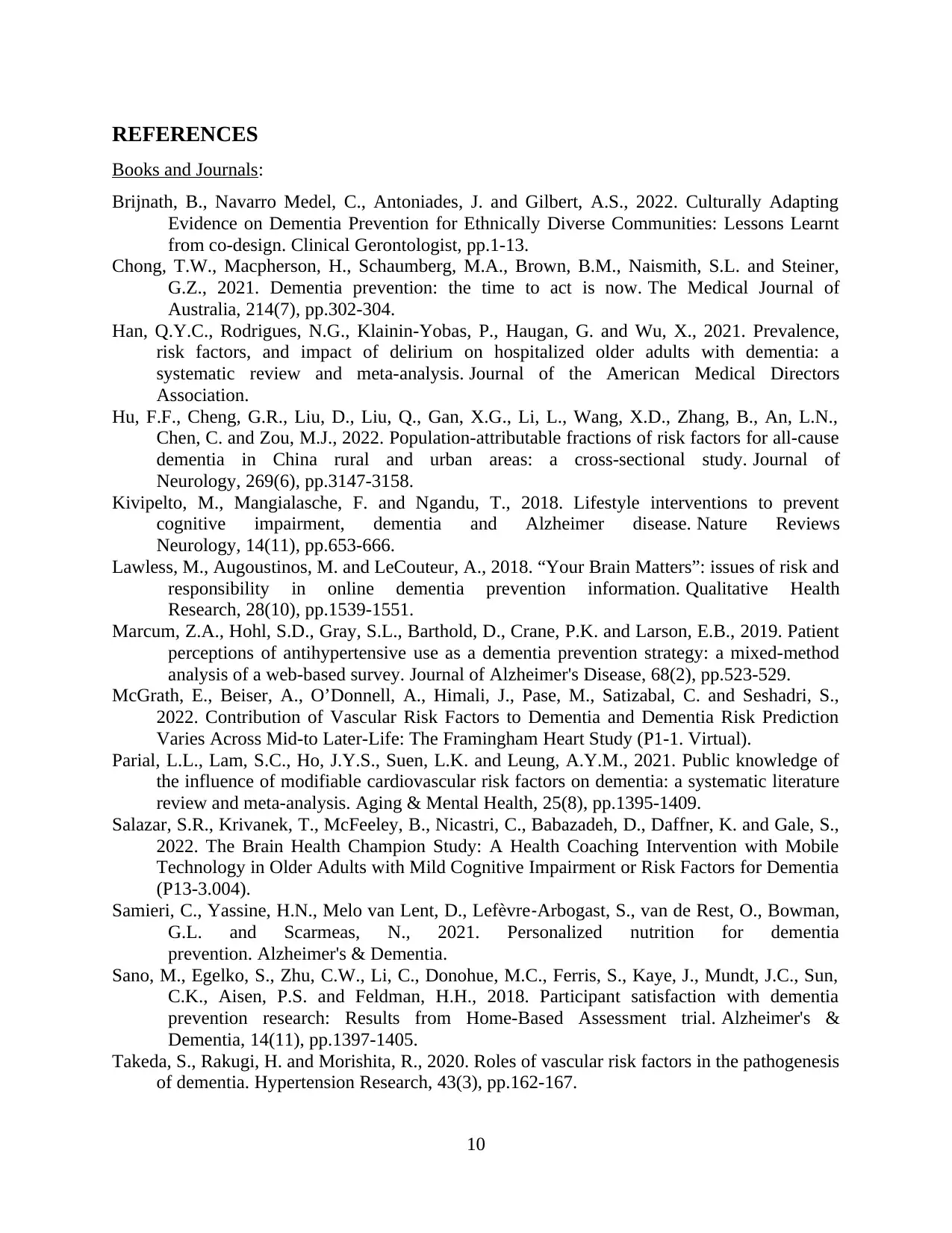
REFERENCES
Books and Journals:
Brijnath, B., Navarro Medel, C., Antoniades, J. and Gilbert, A.S., 2022. Culturally Adapting
Evidence on Dementia Prevention for Ethnically Diverse Communities: Lessons Learnt
from co-design. Clinical Gerontologist, pp.1-13.
Chong, T.W., Macpherson, H., Schaumberg, M.A., Brown, B.M., Naismith, S.L. and Steiner,
G.Z., 2021. Dementia prevention: the time to act is now. The Medical Journal of
Australia, 214(7), pp.302-304.
Han, Q.Y.C., Rodrigues, N.G., Klainin-Yobas, P., Haugan, G. and Wu, X., 2021. Prevalence,
risk factors, and impact of delirium on hospitalized older adults with dementia: a
systematic review and meta-analysis. Journal of the American Medical Directors
Association.
Hu, F.F., Cheng, G.R., Liu, D., Liu, Q., Gan, X.G., Li, L., Wang, X.D., Zhang, B., An, L.N.,
Chen, C. and Zou, M.J., 2022. Population-attributable fractions of risk factors for all-cause
dementia in China rural and urban areas: a cross-sectional study. Journal of
Neurology, 269(6), pp.3147-3158.
Kivipelto, M., Mangialasche, F. and Ngandu, T., 2018. Lifestyle interventions to prevent
cognitive impairment, dementia and Alzheimer disease. Nature Reviews
Neurology, 14(11), pp.653-666.
Lawless, M., Augoustinos, M. and LeCouteur, A., 2018. “Your Brain Matters”: issues of risk and
responsibility in online dementia prevention information. Qualitative Health
Research, 28(10), pp.1539-1551.
Marcum, Z.A., Hohl, S.D., Gray, S.L., Barthold, D., Crane, P.K. and Larson, E.B., 2019. Patient
perceptions of antihypertensive use as a dementia prevention strategy: a mixed-method
analysis of a web-based survey. Journal of Alzheimer's Disease, 68(2), pp.523-529.
McGrath, E., Beiser, A., O’Donnell, A., Himali, J., Pase, M., Satizabal, C. and Seshadri, S.,
2022. Contribution of Vascular Risk Factors to Dementia and Dementia Risk Prediction
Varies Across Mid-to Later-Life: The Framingham Heart Study (P1-1. Virtual).
Parial, L.L., Lam, S.C., Ho, J.Y.S., Suen, L.K. and Leung, A.Y.M., 2021. Public knowledge of
the influence of modifiable cardiovascular risk factors on dementia: a systematic literature
review and meta-analysis. Aging & Mental Health, 25(8), pp.1395-1409.
Salazar, S.R., Krivanek, T., McFeeley, B., Nicastri, C., Babazadeh, D., Daffner, K. and Gale, S.,
2022. The Brain Health Champion Study: A Health Coaching Intervention with Mobile
Technology in Older Adults with Mild Cognitive Impairment or Risk Factors for Dementia
(P13-3.004).
Samieri, C., Yassine, H.N., Melo van Lent, D., Lefèvre‐Arbogast, S., van de Rest, O., Bowman,
G.L. and Scarmeas, N., 2021. Personalized nutrition for dementia
prevention. Alzheimer's & Dementia.
Sano, M., Egelko, S., Zhu, C.W., Li, C., Donohue, M.C., Ferris, S., Kaye, J., Mundt, J.C., Sun,
C.K., Aisen, P.S. and Feldman, H.H., 2018. Participant satisfaction with dementia
prevention research: Results from Home-Based Assessment trial. Alzheimer's &
Dementia, 14(11), pp.1397-1405.
Takeda, S., Rakugi, H. and Morishita, R., 2020. Roles of vascular risk factors in the pathogenesis
of dementia. Hypertension Research, 43(3), pp.162-167.
10
Books and Journals:
Brijnath, B., Navarro Medel, C., Antoniades, J. and Gilbert, A.S., 2022. Culturally Adapting
Evidence on Dementia Prevention for Ethnically Diverse Communities: Lessons Learnt
from co-design. Clinical Gerontologist, pp.1-13.
Chong, T.W., Macpherson, H., Schaumberg, M.A., Brown, B.M., Naismith, S.L. and Steiner,
G.Z., 2021. Dementia prevention: the time to act is now. The Medical Journal of
Australia, 214(7), pp.302-304.
Han, Q.Y.C., Rodrigues, N.G., Klainin-Yobas, P., Haugan, G. and Wu, X., 2021. Prevalence,
risk factors, and impact of delirium on hospitalized older adults with dementia: a
systematic review and meta-analysis. Journal of the American Medical Directors
Association.
Hu, F.F., Cheng, G.R., Liu, D., Liu, Q., Gan, X.G., Li, L., Wang, X.D., Zhang, B., An, L.N.,
Chen, C. and Zou, M.J., 2022. Population-attributable fractions of risk factors for all-cause
dementia in China rural and urban areas: a cross-sectional study. Journal of
Neurology, 269(6), pp.3147-3158.
Kivipelto, M., Mangialasche, F. and Ngandu, T., 2018. Lifestyle interventions to prevent
cognitive impairment, dementia and Alzheimer disease. Nature Reviews
Neurology, 14(11), pp.653-666.
Lawless, M., Augoustinos, M. and LeCouteur, A., 2018. “Your Brain Matters”: issues of risk and
responsibility in online dementia prevention information. Qualitative Health
Research, 28(10), pp.1539-1551.
Marcum, Z.A., Hohl, S.D., Gray, S.L., Barthold, D., Crane, P.K. and Larson, E.B., 2019. Patient
perceptions of antihypertensive use as a dementia prevention strategy: a mixed-method
analysis of a web-based survey. Journal of Alzheimer's Disease, 68(2), pp.523-529.
McGrath, E., Beiser, A., O’Donnell, A., Himali, J., Pase, M., Satizabal, C. and Seshadri, S.,
2022. Contribution of Vascular Risk Factors to Dementia and Dementia Risk Prediction
Varies Across Mid-to Later-Life: The Framingham Heart Study (P1-1. Virtual).
Parial, L.L., Lam, S.C., Ho, J.Y.S., Suen, L.K. and Leung, A.Y.M., 2021. Public knowledge of
the influence of modifiable cardiovascular risk factors on dementia: a systematic literature
review and meta-analysis. Aging & Mental Health, 25(8), pp.1395-1409.
Salazar, S.R., Krivanek, T., McFeeley, B., Nicastri, C., Babazadeh, D., Daffner, K. and Gale, S.,
2022. The Brain Health Champion Study: A Health Coaching Intervention with Mobile
Technology in Older Adults with Mild Cognitive Impairment or Risk Factors for Dementia
(P13-3.004).
Samieri, C., Yassine, H.N., Melo van Lent, D., Lefèvre‐Arbogast, S., van de Rest, O., Bowman,
G.L. and Scarmeas, N., 2021. Personalized nutrition for dementia
prevention. Alzheimer's & Dementia.
Sano, M., Egelko, S., Zhu, C.W., Li, C., Donohue, M.C., Ferris, S., Kaye, J., Mundt, J.C., Sun,
C.K., Aisen, P.S. and Feldman, H.H., 2018. Participant satisfaction with dementia
prevention research: Results from Home-Based Assessment trial. Alzheimer's &
Dementia, 14(11), pp.1397-1405.
Takeda, S., Rakugi, H. and Morishita, R., 2020. Roles of vascular risk factors in the pathogenesis
of dementia. Hypertension Research, 43(3), pp.162-167.
10
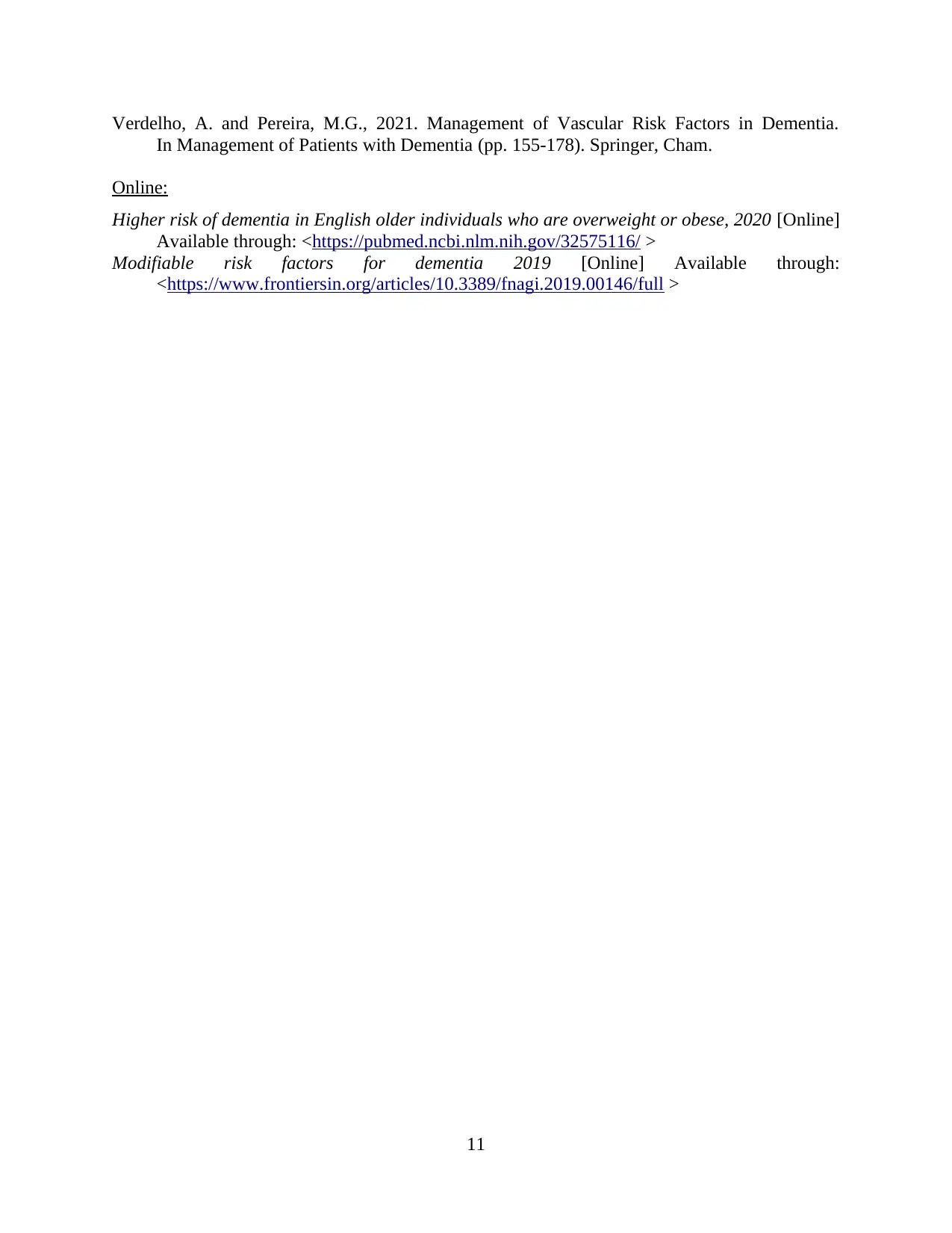
Verdelho, A. and Pereira, M.G., 2021. Management of Vascular Risk Factors in Dementia.
In Management of Patients with Dementia (pp. 155-178). Springer, Cham.
Online:
Higher risk of dementia in English older individuals who are overweight or obese, 2020 [Online]
Available through: <https://pubmed.ncbi.nlm.nih.gov/32575116/ >
Modifiable risk factors for dementia 2019 [Online] Available through:
<https://www.frontiersin.org/articles/10.3389/fnagi.2019.00146/full >
11
In Management of Patients with Dementia (pp. 155-178). Springer, Cham.
Online:
Higher risk of dementia in English older individuals who are overweight or obese, 2020 [Online]
Available through: <https://pubmed.ncbi.nlm.nih.gov/32575116/ >
Modifiable risk factors for dementia 2019 [Online] Available through:
<https://www.frontiersin.org/articles/10.3389/fnagi.2019.00146/full >
11
1 out of 13
Related Documents
Your All-in-One AI-Powered Toolkit for Academic Success.
+13062052269
info@desklib.com
Available 24*7 on WhatsApp / Email
![[object Object]](/_next/static/media/star-bottom.7253800d.svg)
Unlock your academic potential
© 2024 | Zucol Services PVT LTD | All rights reserved.





